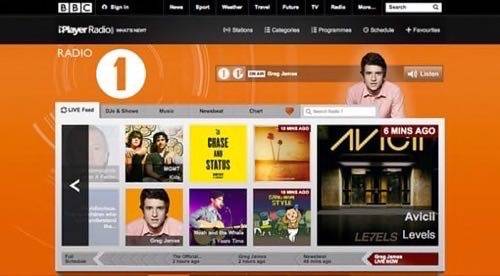
For a media organization founded in the 1920s, the British Broadcasting Corporation has done a remarkable job of keeping up with the times. Its iPlayer media app is adored by those fortunate enough to have access to it. This week, the BBC launched an iPlayer spinoff that focuses on radio. It’s a great start, but if you’re eagerly awaiting radio’s future, you might want to hang tight.
To be fair, iPlayer Radio is a solid offering. The attractively designed Web app is a focused way to stream live broadcasts from any of the BBC’s many channels. There’s a ton of content here, both live and archived. It’s all broken down by channel, category, schedule and – as you drill down further – topic area, personality, format and music genre. It’s a handy online portal into the BBC’s radio experience, much of which is available to users around the world.
Geography is where the concept starts to fizzle. I live in the United States, so there are limitations on what I can hear on iPlayer Radio. For one thing, the iOS apps aren’t available here, so I have no choice but to point my iPhone and iPad browsers to the Web app. To the BBC’s credit, streaming a live broadcast works fairly well, and I can minimize the browser, launch another app and continue to listen uninterrupted. But even in the browser, I’m blocked from streaming certain shows in the archive. Bummer. I don’t know precisely what the future of radio looks like, but I’m pretty sure it doesn’t include the sentence, “This content is not available on your device.”
As well designed as the Web app is, it still feels a little fractured. Not all the audio content on iPlayer Radio is funneled to the same pop-up window, for example. Some of it plays natively in the browser tab in which you initiate the stream, while some of it launches a new player in pop-up window. If you’re already streaming from one of those pop-ups and then decide to switch to another channel, iPlayer Radio will fire up another pop-up. In many cases, you end up with concurrent streams of audio, which turn into a cacophonous trainwreck of sound until you manage to find one of the stop buttons. It’s weird.
To improve this particular aspect of the user experience, the BBC might want to borrow a page from SoundCloud or Shuffler.fm, both of which feature a single universal audio player that keeps streaming no matter where you navigate and then switches to a new audio stream when you ask for it. Other bastions of radio innovation have good ideas as well – NPR, Stitcher Radio, TuneIn and Pandora come to mind.
The BBC might be, as radio futurologist James Cridland put it, a bit late to the party on this, but it’s a valiant effort, on the whole. The BBC has some incredibly high-quality content, often containing deeply valuable, alternative viewpoints. This new initiative helps open it up to a wider global audience. The mobile apps (from what I can tell) look especially well designed, with innovative carousel navigation and an alarm to wake up to the BBC. It’s the mobile experience that has the greatest potential to steer radio’s future, especially as smartphones continue to find a place in cars.
It’s worth noting that iPlayer Radio is only the player’s first iteration. The BBC knows that online streaming and mobile technology are going to be a central component of their future. It will be interesting to see how it unfolds.

















